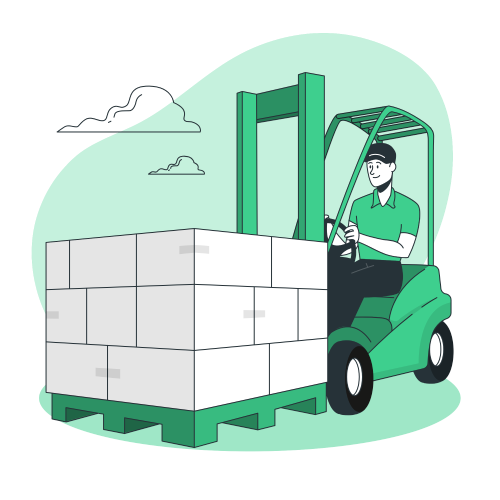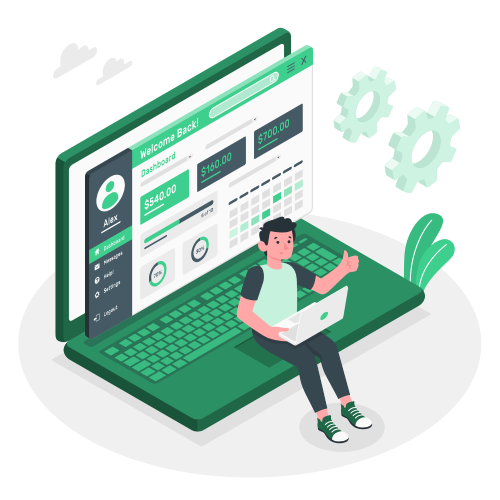ERP
ERP for Logistics: the Solution to Improve your Flow Management
Contents
What is ERP for logistics?
A logistics ERP is a computerized system for planning and managing a company’s supply operations. It is a module or functionality specifically designed to meet logistics needs, including inventory control, order tracking, warehouse management, transportation and delivery planning.
Enterprise resource planning (ERP) softwares track the flow of goods from the moment they enter the company (reception of raw materials or finished goods) to the moment they are delivered to customers.
The main aim of ERP is to optimize supply chain operations, reduce costs, improve efficiency, minimize waiting times and guarantee on-time delivery of products. It also enables better visibility of available items, traceability of goods, tracking of customer and supplier requests, and collaboration between the various supply chain stakeholders.

How can ERP give you greater control over your logistics management?
Using logistics software can help you gain greater control over your operations. Here are just a few ways you can achieve this:
Data centralization
An ERP solution centralizes related statistics, such as instructions on stocks, purchases, suppliers, warehouses, carriers and so on. It provides a complete overview of your organization, making it easier to make decisions based on accurate, up-to-date information.Process automation
It automates a wide range of activities, such as inventory management, shipping document generation, delivery planning and more. This reduces manual tasks, risks of error and delays, while improving operational efficiency.Real-time inventory tracking
You can track your goods live. You have precise visibility of warehouse traffic, movements, arrivals and departures.Integrated order management
The tool integrates order tracking, from receipt to dispatch. You can track the status of requests, check delivery times, manage returns and exchanges, and easily communicate with requesters and suppliers.Optimized delivery planning
ERP facilitates goods planning, taking into account availability, processing times, transport routes and constraints. You can optimize routes, minimize transit times, reduce costs and improve goods punctuality.Traceability and incident tracking
Track and trace products throughout the supply chain. In the event of incidents or problems, you can quickly identify the source of the problem, take corrective action and communicate with the parties concerned to resolve issues quickly.Performance analysis
The software collects information on performance, such as delivery times, customer satisfaction rates, tariffs and so on. You can analyze this data using integrated analysis tools to assess performance, identify opportunities for improvement and make informed decisions.What are the features and functionalities of an ERP?
Here are the main features and tools of an ERP platform:
Integrated process management
ERP makes it possible to integrate different business functions, such as purchasing, sales, accounting, human resources, production control, logistics, etc.Centralized database
It uses a centralized statistical database to record all company information. This ensures consistency of figures, provides fast and secure access to instructions, and facilitates analysis and reporting.Process automation
ERP automates many business services, reducing manual tasks, errors and delays. Automated workflows optimize operations, improve efficiency and reduce costs.

Resource planning and control
It facilitates the planning of company resources, such as financial resources, human resources, raw materials, production capacity, etc.Data monitoring and analysis
It collects live company operations and provides detailed reports and analysis to assess performance, identify trends, detect problems and make decisions based on accurate figures.Supply chain monitoring
Manages the company's supply chain, coordinating production, storage and distribution activities.Customer relationship management
It often includes customer relationship management (CRM) functionalities to track customer interactions, manage business opportunities, improve satisfaction and develop better business relationships.Data security
ERP systems incorporate robust security mechanisms to protect business data from unauthorized access, loss, or damage. This guarantees the confidentiality and integrity of sensitive information.Customization and extensibility
They often offer customization and extensibility tools to meet specific business needs. Companies can adjust and configure the tool to suit their unique business processes.
5 advantages of an ERP specialized in logistics:
Equipping yourself with an ERP offers several important advantages for a firm. Here are some of the main advantages:
1
Increased visibility
An ERP provides instant visibility over the entire supply chain, including inventory, orders, shipments, carriers, etc.2
Process optimization
It enables logistics activities to be automated and optimized. This leads to greater operational efficiency, fewer errors and improved productivity.3
Cost reduction
By optimizing your supply chain, you can reduce expenditure on labor, storage, transport control and delays. Better resource and route planning minimizes expenses and optimizes the use of available resources.4
Better inventory control
An ERP platform offers advanced organization of goods, enabling provision levels, movements, receipts and issues to be tracked with precision, avoiding overstocking or shortages, optimizing and reducing inventory costs.5
Data-driven decision-making
By collecting and analyzing figures in real time, it provides valuable instructions for making informed decisions. The reports and analysis generated identify trends, bottlenecks and opportunities for improvement, facilitating strategic organization.Why choose Axelor ERP to optimize your logistics flows?
There are many reasons why you might choose Axelor to optimize your flows. Here are just a few of the benefits of ERP:
Complete logistics management
Axelor offers comprehensive management applications, covering everything from product and warehouse tracking to arrival planning and shipment tracking. So you can manage your entire supply chain in an integrated way.Modularity and customization
ERP software is modular in design, so you can choose the specific modules you need. You can also customize functionalities and workflows to meet the specific needs of your supply chain.Integration with other corporate functions
The tool enables complete integration with other corporate functions, such as sales organization, accounting, human resources, etc. It promotes harmonious collaboration between different departments.Product traceability
It offers item traceability performance, enabling you to track and trace the movement of goods throughout the supply chain.Process optimization
The platform enables you to automate and optimize your actions, reducing manual tasks, errors and delays. You can easily set up automated workflows to improve the efficiency and productivity of your operations.Performance analysis
The software collects performance indices, enabling you to analyze and evaluate key performance indicators (KPIs) to identify opportunities for improvement. You can track delivery times, transport prices, customer satisfaction rates, etc., to make informed decisions and optimize your logistics movements.Find out how our ERP can help improve your business performancee
An expert will contact you shortly to discuss your project.